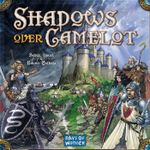- Publisher
- Days of Wonder
- Published in
- 2005
- My Rating
- 8.0
- BGG Rating
- 6.94
- BGG Rank
- 532
- Players
- 3-7
- Ages
- 10+
- Duration
- 1:30
- Complexity
- 2.5661 / 5
- Acquired
- March 2006
- Eager to Play
- No
- Plays
- 5
- Last Played
- May 05, 2010
- Time Spent
- 7:30
Shadows Over Camelot is a semi-cooperative game where the players are knights of the Round Table; there is a chance that one of the players is a traitor, working against the Round Table, but it is by no means guaranteed. Each turn the players may take 1 free action or may sacrifice a life point and take 2 actions, but they must always draw a card from the black deck which represents the opposition's actions. The knights must complete quests thereby winning white swords, but if any quests are lost they gain black swords. At the end of the game if there are more white than black swords the loyal knights win, otherwise the traitor and/or the game wins.
Since the role of the opposition is played out via a deck of cards the players must coordinate their actions in order to win the game. Many quests will ebb and flow, and this will add great tension to the decisions. A wasted decision can spell disaster. On their turns the players must choose to move to a quest, or play a card from their hand on their current quest location, but if they cannot play a card on their current quest they must move. Players must think ahead as moving can be a tiresome waste. Players may also accuse someone of being the traitor, but they are penalized if they get it wrong, however if there is a traitor and he is undiscovered he may convert 2 white swords to black and thus tip the scales.
This is a great cooperative game that has seen many a knight die, a few traitors win, and required active participation by all players.
Five plays
- May 05, 2010
- August 15, 2009
- November 18, 2006
- April 22, 2006
- March 18, 2006
